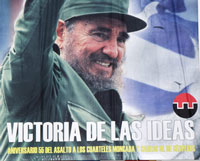 The tiny Caribbean nation of Cuba that had a profound impact on American thought a half-century ago will be examined at a symposium, “The Cuban Revolution: 50 Years Later,” on Tuesday, April 14, starting at 2 p.m. in Rosch Recital Hall at SUNY Fredonia.
The tiny Caribbean nation of Cuba that had a profound impact on American thought a half-century ago will be examined at a symposium, “The Cuban Revolution: 50 Years Later,” on Tuesday, April 14, starting at 2 p.m. in Rosch Recital Hall at SUNY Fredonia.
A panel of faculty experts will make individual 20 minute-presentations, followed by a 10-minute question/answer session. Due to the busy nature of the spring term, students and staff are free to enter and depart the hall at any time. Refreshments will be served at the program conclusion.
Devoting a symposium to Cuba advances SUNY Fredonia’s goal to expand the Hispanic presence on campus, said Dr. John Kijinski, dean of the College of Arts and Humanities, symposium sponsor. The event also reflects the university’s efforts to develop an international education exchange with Oaxaca, Mexico. “We have this rich, other world that is so much closer to us than Europe,” Dr. Kijinski added. “Making its presence felt here is very important."
Speakers and their topics include the following:
- James Stevens, Department of English, “Writing Off the Island,” discussion of the work of playwright Reinaldo Arenas;
- Eric Meringer, Department of History, exploration of revolutionary musical anthems of Cuba and Central America;
- John Staples, chair of the Department of History, discussion of the impact Cuba had on Soviet public consciousness;
- John Bacon and the Latin Jazz Ensemble of the School of Music, performance of Cuban music that has had an impact on American jazz; and
- Alberto Rey, Department of Visual Arts and New Media, screening of a short film on his own experience as a Cuban artist returning to Cuba.
Arranging a conference devoted to Cuba could not be more appropriate in any other year. Not only does 2009 mark the 50th anniversary of the Cuban Revolution that thrust Fidel Castro into a leadership position, but the failing health of the longtime ruler in recent years and subsequent transfer in 2008 of the presidency to his brother, Raul, places Cuba in uncharted waters.
Cuba brought the United States closer than it had ever been to a nuclear war with the Cuban Missile Crisis and President John Kennedy’s showdown with the Soviet Union in 1962. A year earlier, the Bay of Pigs invasion sought to restore multiparty Democracy to Cuba, but its failure hastened the deterioration of Cuban-American relations. With so many crises commanding the attention of the United States, Cuba may appear to be neglected.
“It’s such a different world now than it was 50 years ago, and what seemed like something that was so new and so radical then now seems, in many ways, like an antique,” Dr. Kijinski added.
An interdisciplinary approach that encompasses art, music, history, literature and philosophy is a hallmark of symposia organized by the College of Arts and Humanities, and this year’s is no exception. Dr. Kijinski noted that each presenter has an association with Latin America or expertise in its culture and history. Opening remarks will be given by Modern Languages Department Chairperson Carmen Rivera, who is from Puerto Rico.



